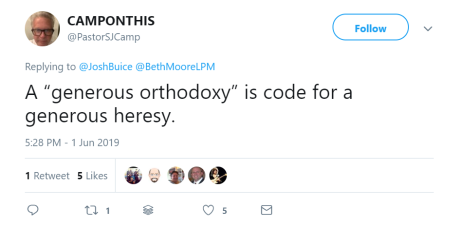I’m sure if you’re like me, you are experiencing Trump fatigue. If he’s good at anything, he’s good at generating headlines, and so if you spend any time of US news media you will have had month after month of outrage on the one hand and complaints about the ridiculousness of the outrage is on the other. Nevertheless, I try to keep an eye on how the Christian world responds to him because the more that the church gets consumed by its culture wars, the more collateral damage accrues to the public image of Christ and it is nothing if not interesting to see what certain Christian groups will sacrifice in the fight for cultural dominance.
Pew Research Center just released data showing again how polarized the response to Trump is, with three-quarters of Republicans interviewed saying that he often makes them feel informed, hopeful, excited, happy, proud, and respected. At the same time, Christianity Today released an editorial in which (while calling for today’s “court prophets” to be more Christian and less partisan) the author gave significant leeway to Christian views that regard Trump as a political figure of the order of King David. This comes in a month in which Trump’s public racism led to crowds chanting for non-white American citizens to “Go back home,” asylum seekers were flown and dumped in Tijuana without resources, and the president was linked with the violent rape of a 13-year-old in the wake of Epstein’s arrest, a withdrawn charge from 1994 that isn’t even counted among the two charges of rape and 18 charges of sexual misconduct that stand against the man. The report of this rape was so underplayed that I had to search it to make sure that it wasn’t a weird slur that some troll had made up (a slur like “Ilhan Omar married her brother,” which Trump decided this week to spread from the highest platform in the English-speaking world). And July still has a good few days to run.
A month like this would be a career destroyer for anyone—unless they were being protected by a powerful group. Unfortunately for Christians in the rest of the world, Donald is protected by large sectors of the white American church (some examples here and here).
Dissenting Christians often seem apologetic in their denunciations of the path conservativism has taken in their country or outright unsure of what matters anymore. By way of example, in Trump’s most recent rally in which racist chanting captured the headlines, he also twice used the expletive “Goddamn.” I saw a few comments from Christians like this:

Now I get that this particular person is trying to argue from a position that all conservative Christians should be able to agree upon: “Christian” presidents shouldn’t be blaspheming. However, what sort of indictment is it upon your society that in a month of rape and pedophilia allegations, racism, intentionally cruel xenophobia, slander, and so on, the best hope for agreement that this person could marshal was that semi-blasphemous expletives are bad?
More troubling still is that this is hardly the blasphemy we should be most worried about. “Blasphemy” is a loan-word from the Greek that means “slander”. We can “slander” God’s name by using it as an expletive, thus cheapening it. However, this is surely a mild form slander (if this phrase counts at all). The kind of blasphemy that should really concern us is that which represents the betrayal of God by worshipping false things (e.g. Ezek 20:27-28) and the kind of blasphemy that results from Christian misbehaviour. We can behave in such a way as to cause outsiders to slander God. Consider how Paul in Romans 2:24 uses Isaiah 52:5: he says “For, as it is written, ‘The name of God is blasphemed among the Gentiles because of you [the Jewish leaders behaving in hypocrisy].'” Similarly, 2 Peter 2:2 says, “And many will follow their [the false teachers’] sensuality, and because of them the way of truth will be blasphemed.”
Has Christian support for Trump exposed idolatries? That the Faith & Freedom Coalition could say, “There has never been anyone who has defended us and who has fought for us, who we have loved more than Donald J. Trump. No one!” implies a few, in my opinion.
Has aligning the church with Trump caused God’s name to be slandered? Of course. Every day. The revelation that Trump doesn’t care about how he speaks about God adds nothing new to the discussion. There has been a relentless stream of attitudes and behaviours that make Christian alliance with him blasphemous.
The American church is said to be shrinking, and this at least in part is motivating the tactics employed in their culture wars. It seems as though Christians are worried that it is secularism that is pulling people out of the pews. Ironically, however, the fact that culture wars have led to an “all’s fair” approach on the part of sectors of the church has radically eroded away any distinctive voice for truth and morality in public Christianity. In prostituting itself to this president, Christians not only fail to be an attractive alternative to the moral brokenness of this world, we’ve become public defenders of some of it’s most grotesque abuses.
The culture wars are lost already because the church is not fighting with the weapons it has been given: truth, love, unity, justice, mercy. Maybe it’s not secularism that is emptying the church; maybe it’s the fact that the church has become such a den of robbers that the secular world has become more attractive than we are.




